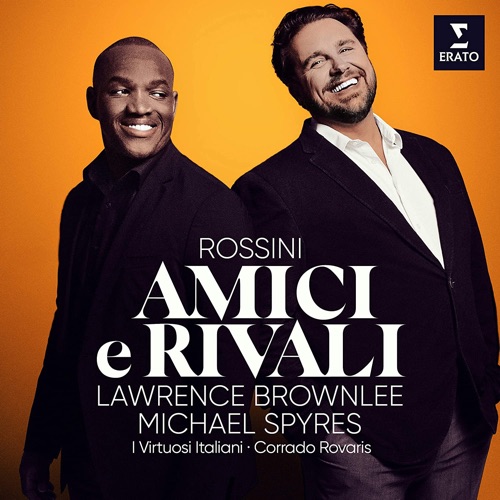
Showering listeners with death-dying high notes and dazzling agility, every track glows with bel canto sunshine.
I received the Amici sound files on a Friday afternoon several months ago and there went my weekend! The first time through was so jaw-droppingly wonderful, I immediately hit repeat…and then again…and again. Crescendoing earworms haunted me for days, but then Rossini has always been my favorite bel canto composer. You can take your Scottish madwomen and Tudor Queens. trilling sleepwalkers and misbehaving Druids—well, most of the time anyway.Over the years I’d become more and more interested in “serious” Rossini, so I was disappointed that the producers included the Almaviva-Figaro duet from Il Barbiere di Siviglia and positioned it first. Haven’t we all hear this many, many times? I’ll even admit that when I listen to Barbiere I usually skip from the Overture to “Una voce poco fa”! But, to my surprise, Brownlee and Spyres’s sly and delightful duetting won me over. While I’m not entirely convinced by labeling Spyres a “baritenor,” he effortlessly embodies Figaro and that first track immediately establishes the winning contrast between the two men: Brownlee’s lighter, higher, more brilliant tenor “versus” Spyres’s weightier, warmer, rounder instrument.
If one could be said to dominate the CD, it’s Brownlee as he, amidst a fabulous program of duets and trios, also impresses with two prime solos: Ricciardo’s sparkling “S’ella me e ognor Fedele” from Ricciardo e Zoraide and Néoclès’s soulfully florid scene from Le Siège de Corinthe. Spyres sings Cléomène in the Siège trio that follows, and he too got a stab at Néoclès for a Naxos CD.I remember liking Brownlee’s 2014 all-Rossini album, yet I wasn’t as blown away by it as I was by Amici. Relistening to the earlier recital confirmed my initial impression that a crucial factor in the CD’s success is the stylishly incisive conducting of Corrado Rovaris and the brilliant playing of I Virtuosi Italiani, a group I hadn’t heard previously.
My abiding affection for Spyres has previously resulted in two editions of Trove Thursday dedicated to him, one including Rossini’s Ermione.
Brownlee arrived at the Met in 2007, where I’ve savored his appearances in La Cenerentola, Armida and La Donna del Lago, but Spyres only made his (smashing) long overdue Met debut in La Damnation de Faust earlier this year.
Amici finds Spyres in lustrously secure voice commanding the strikingly wide range Rossini used for Andrea Nozzari. He also brings a welcome gravitas to Otello and Cléomène which plays beautifully off Brownlee’s more boyish eagerness.
A recent commenter on “Amici” wondered why no one had brought together this spectacular double-tenor music before, but Opera Rara had in fact set down Rossini: Three Tenors featuring Bruce Ford, William Matteuzzi and Paul Austin Kelly nearly 25 years ago.It too features selections from Ricciardo, Donna del Lago, Otello and Armida. I pulled the CD off my shelf for the first time in years and while it features some nice singing, like Brownlee’s recital, it suffers from polite, rather bland conducting.
But the Opera Rara trumped the Erato release in two ways; it provided a chorus so the entire dazzling Donna del lago sequence could be included, and Nelly Miricioiu was invited to be that trio’s Elena. Unfortunately for Amici, Tara Erraught’s vibrato-ridden mezzo proves a serious blot on the Donna del lago, Siège and Otello excerpts. When I got the recording, I jumped to the Donna del lago trio as it’s one of my very favorite Rossini moments. However, my hopes for the CD dropped precipitously as Erraught’s squally shrilling derailed the selection.
I had attended the 2012 Richard Tucker Gala which hosted Erraught’s US debut (when she was bruited as the “Irish Bartoli”) in an utterly undistinguished “Una voce poco fa;” I figured that would the last I’d hear of her, but alas…
The recording’s other invited guest, young Spanish tenor Xabier Anduaga, makes a worthy collaborator and holds his own in the thrilling Armida trio that concludes the disc.Listening to Ford and Kelly on the Opera Rara recording, I was reminded how crucial American tenors have been to the renaissance of Rossini’s serious operas over the past half-century. Back in the day performances were often grievously compromised by tenors ill-equipped to cope with the composer’s challenging writing. But with the arrival of Rockwell Blake and Chris Merritt, suddenly one no longer had to cut or simplify the many tenor roles—Armida alone has six!
Following Blake and Merritt were Gregory Kunde, Frank Lopardo, David Kuebler, Kenneth Tarver and Donald Kaasch, to name just a few. I missed Robert Gambill during his bel canto career, but after he became a notable Wagnerian I heard him at the Berlin Staatsoper as Tannhäuser, Siegmund and Parsifal. Merritt and Kaasch eventually too moved into heavier repertory, both singing Herod in Salome, while Kunde must be the only tenor to have performed both Rossini’s and Verdi’s Otello in the same season.
Bruce Fowler, Robert McPherson, and Bruce Sledge stepped up, with John Osborn currently sharing Brownlee and Spyres’s primacy as leaders in this repertoire. And the next American to dominate in these operas may be Jack Swanson, who recently had a triumph in Frankfurt as Otello’s Rodrigo.
If you care to check out Swanson’s Almaviva—clad only in his boxers—skip to “All’idea di quel metallo” in the recent Oslo pandemic-produced Barbiere beginning around the 24-minute mark!In October, Brownlee and Spyres reunited in Italy for a concert with piano of selections from “Amici e Rivali.” It’s fun to watch them perform but the studio recording remains a must-have!
Let’s hope there are more tenor duets for these guys—portmanteau name: Spylee! Please “Amici e Rivali Due!”In the meantime, Erato just recorded a new Mitridate, Re di Ponto in Paris with Spyres in the title role and break-dancing countertenor-hunk Jakub Józef Orlinski as Farnace.



